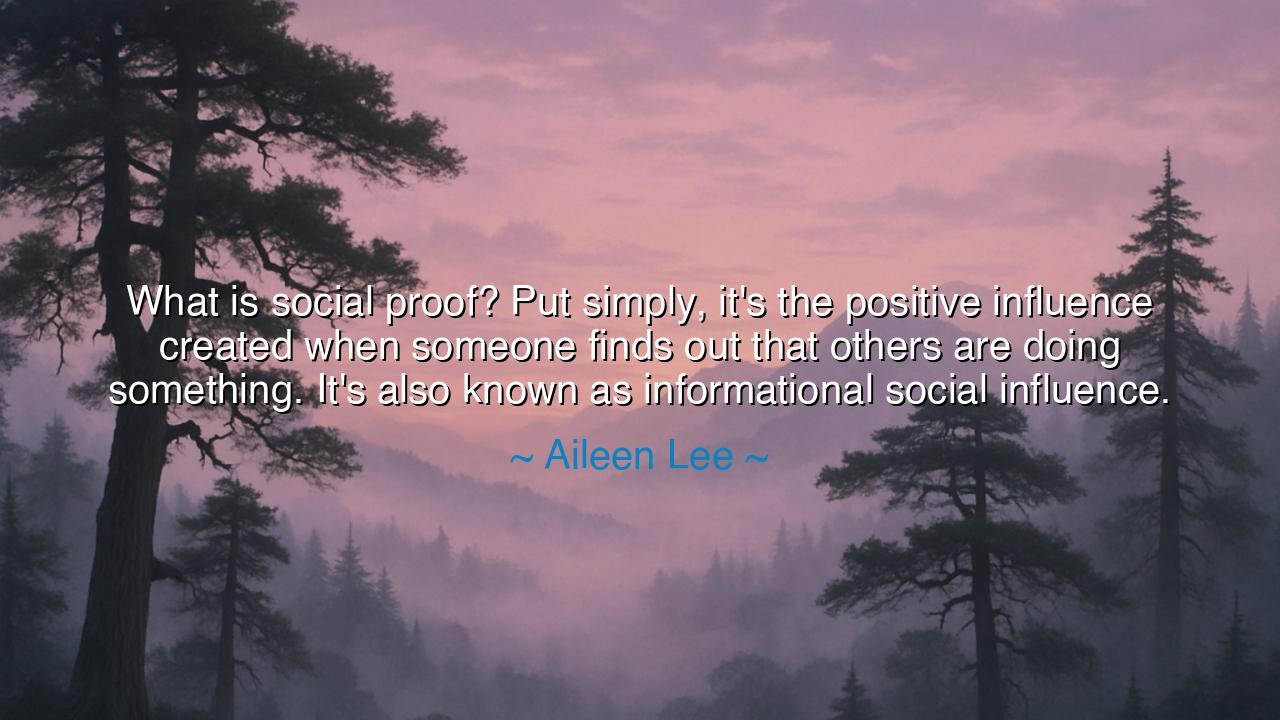
What is social proof? Put simply, it's the positive influence
What is social proof? Put simply, it's the positive influence created when someone finds out that others are doing something. It's also known as informational social influence.






The words of Aileen Lee—“What is social proof? Put simply, it’s the positive influence created when someone finds out that others are doing something. It’s also known as informational social influence.”—unveil a truth as old as humanity itself. Though she speaks in the language of modern commerce and psychology, the principle she names is ancient, woven into the fabric of tribes, cities, and nations. Social proof is the invisible thread that binds individuals together into collective action; it is the power of the example, the persuasion of the many, the force that shapes culture not by decree but by imitation.
From the earliest days of humankind, survival depended upon watching and following others. If the hunters fled a path, the tribe knew danger lay there. If the gatherers ate a certain berry, others were emboldened to do the same. This was informational social influence in its purest form: the wisdom of the group guiding the choices of the individual. What Lee names as “positive influence” is the same instinct that once kept our ancestors alive. To follow the example of others is to borrow their experience, to trust the testimony of the crowd when one’s own knowledge is lacking.
History offers us powerful examples of this force at work. Consider the civil rights movement in America. When ordinary men and women saw others marching peacefully, sitting at lunch counters, or riding buses in defiance of segregation, they were stirred to action. Each act of courage became social proof for the next. A single marcher could be dismissed, but hundreds upon hundreds inspired a nation. In this way, the influence of example turned into a tidal wave of change. What Lee calls “positive influence” here became the spark that moved society toward justice.
Yet we must also acknowledge that social proof is double-edged. For just as it inspires the good, it can also perpetuate harm. The same influence that leads people to generosity can also lead them into cruelty, conformity, and silence in the face of evil. The ancients knew this, warning often of the dangers of the mob. Socrates himself was condemned by a city swayed not by truth but by the opinion of the many. Thus, Lee’s definition, while clear and accurate, must be handled with discernment. Social proof is powerful—but power without wisdom can destroy.
And so the challenge before us is not whether social proof exists, but how we wield it. Each person, by their actions, becomes proof to another—either of courage or of cowardice, of kindness or of cruelty. What we do in the open shapes the choices of those who watch in silence. This is why leaders, parents, teachers, and creators must walk carefully, for their example multiplies far beyond what they see. To live with integrity is to seed the world with good influence, which others will carry forward.
The lesson, then, is both simple and profound: know the power of example, both given and received. When you are uncertain, look to those whose lives bear the fruit of wisdom, and let their path guide you. But also remember that others look to you, and in your daily choices, you are shaping unseen lives. Strive to be the kind of social proof that uplifts, not the kind that corrupts. In doing so, you will not only guard your own steps but illuminate the path for countless others.
So, dear listener, hear this truth as a call to action. Do not underestimate the influence of your deeds. A smile, an act of courage, a word of kindness may ripple outward and transform more than you know. And when you yourself are swayed by the example of others, choose carefully which voices you heed. For as Aileen Lee reminds us, social proof is one of the most powerful forces in human life—let it not lead you astray, but lift you and all around you toward what is noble, just, and good.






TBThi Bao
This makes me reflect on the digital age, where social proof is everywhere—from likes and shares to product reviews. How much do online signals shape our decisions without us realizing it? I also wonder if informational social influence can create herd behavior that stifles originality or independent thinking. Could understanding social proof empower people to leverage it consciously, both in professional settings and in everyday social interactions?
AVPham Thi Ai Vy
Reading this, I wonder about the balance between beneficial and harmful social influence. How do we decide which behaviors to adopt because of social proof versus independent evaluation? Can social proof be harnessed for positive social change, like encouraging healthy habits or community engagement? I’m also curious about the interplay between social proof and peer pressure—are they fundamentally the same, or does one rely more on observation than direct persuasion?
QTDao Quang Truong
I find this concept fascinating because it shows how human psychology drives conformity. Could social proof explain trends, viral content, or even investment bubbles? I’m curious whether people with higher self-awareness are less susceptible to social proof, or if it affects everyone regardless of critical thinking skills. How can understanding informational social influence help us make more intentional and informed decisions in daily life?
BTHue Bui thi
This explanation makes me think about how much of our behavior is influenced by seeing what others do. I wonder whether social proof is always positive, or if it can sometimes lead to poor decisions just because everyone else is doing them. How do marketers and social media platforms use social proof to shape choices, and how can individuals recognize when they’re being influenced without realizing it?